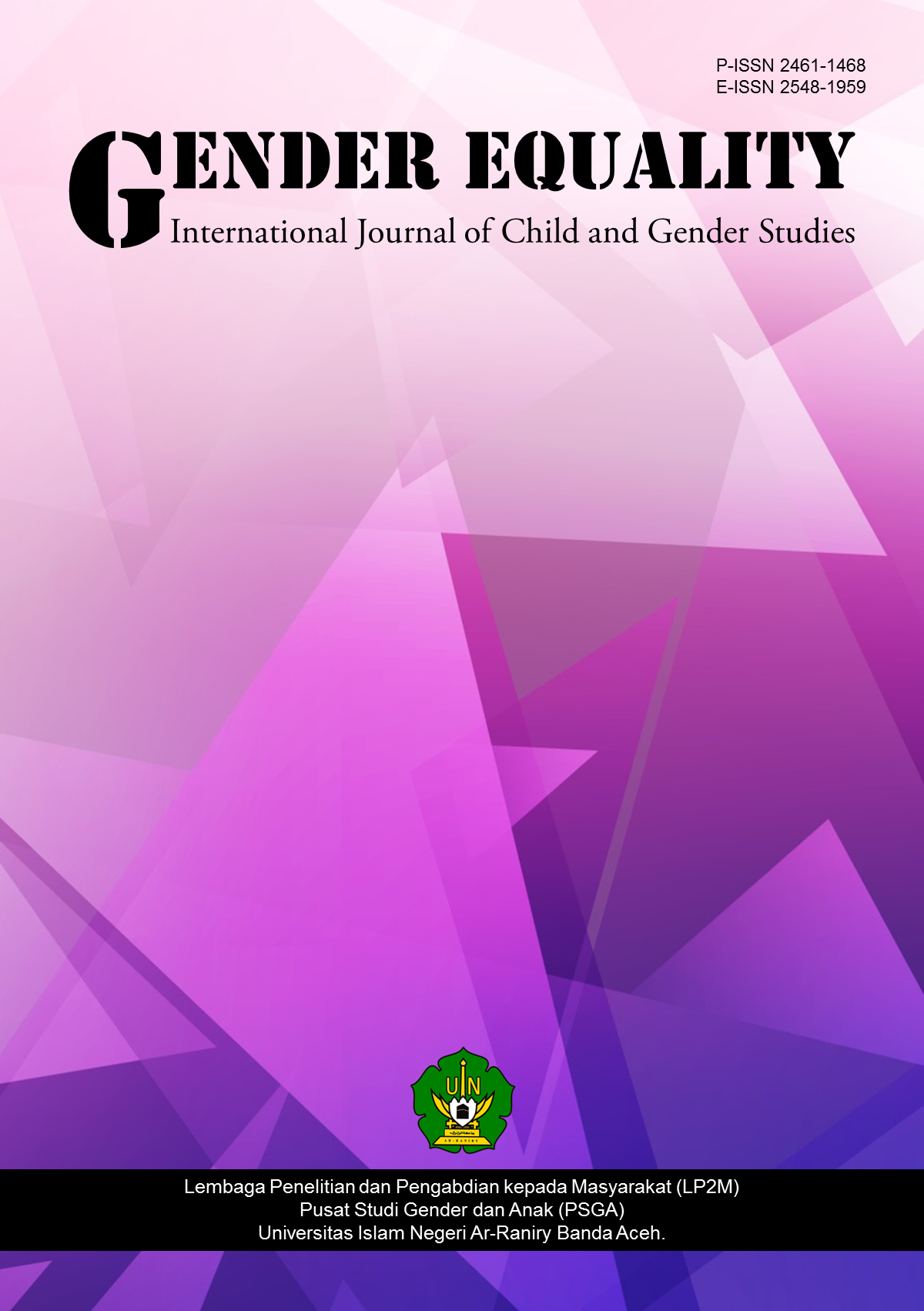Discontinuity formulation of restitutions in Aceh qanun against the protection of rape victims
DOI:
https://doi.org/10.22373/equality.v7i2.9059Keywords:
Gender, restitution, rape crime, Qanun JinayatAbstract
This study discusses the fulfilment of the rights of rape victims in Aceh in the form of restitution payments. Restitution which is the main punishment in Qanun Aceh No. 6 of 2014 concerning the Jinayat Law, has never been included in the judge's decision in the cases of rape. Basically Qanun Jinayah has shown its side with rape victims by formulating punishments for perpetrators which are certain to have a deterrent effect such as the length of prison sentences and the number of sentences handed down to the perpetrators. However, the problem of hampering the fulfilment of restitution to victims is a new problem in the realm of enforcing the Jinayah Qanun in Aceh. This raises the question of why restitution was never included in the decision of the Sharia Court for the rape case in Aceh. This research is a literature study using a normative approach which is then explained descriptively. The results of this study showed that the restitution was never included in the decision is due to the incompatibility of the restitution formulation mentioned in the Jinayat Law Qanun and later referred to differently in the Jinayat Procedural Law, namely as compensation. The fulfilment of this right to restitution is also hampered due to the absence of a governor's regulation that contains technical rules regarding the mechanism for executing restitution for victims. The impact of this discontinuity in the formulation of restitution makes judges unable to include sanctions for restitution in their decisions.
References
Mabrur, A., Muhammad, R. A., & Din, M. (2017). Konsepsi pidana hudud dalam Qanun Jinayat Aceh-Indonesia dan Brunei Darussalam. Kanun Jurnal Ilmu Hukum, 19(1), 19-44.
Amrullah, A. (2019). Perlindungan hukum terhadap anak yang berkonflik dengan hukum pidana adat di Aceh Selatan (Studi terhadap pelaksanaan qanun kemukiman Kuala Ba’u kecamatan Kluet Utara kab. Aceh Selatan). Gender Equality: International Journal of Child and Gender Studies, 4(1), 55-72.
Nairazi AZ. (2020). Pembayaran ganti rugi bagi korban pemerkosaan dalam Qanun Aceh nomor 6 tahun 2014. Jurnal Hukum Samudra Keadilan, 15(1), 67-85.
Ali, M. D. (1998). Hukum Islam: Pengantar ilmu hukum dan tata hukum Islam di Indonesia. Jakarta: Raja Grafindo Persada.
Anindia, I. A. (2019). Perlindungan hukum terhadap perdagangan anak dengan modus pernikahan dalam perspektif viktimologis. Jurnal Litigasi (E-Journal), 19(1), 89-115.
CR-23. (2016). Ini 11 putusan MA berstatus Landmark Decisions tahun 2016. Jakarta: Hukum Online.com.
Daulat, P. A. S. (2018). Urgensi penggunaan sanksi hukum pidana dalam konteks penanggulangan kejahatan. Jurnal Ilmiah Hukum Dan Dinamika Masyarakat, 16(1), 79-86.
Rahmi, E. M., Bakar, A. A., & Suhaimi, S. (2019). Pelaksanaan ‘uqubat restitusi terhadap korban perkosaan. Kanun Jurnal Ilmu Hukum, 21(2), 227-240.
Hamzah, A. (2016). Delik-delik tertentu di dalam KUHP. Jakarta: Sinar Grafika.
Zuanny, I. P., Mawarpury, M., & Khairani, M. (2017). Daya lenting (resilience) pada perempuan korban perkosaan. Gender Equality: International Journal of Child and Gender Studies, 2(2), 81-90.
Kamarusdiana, K. (2016). Qânûn Jinâyat Aceh dalam Perspektif Negara Hukum Indonesia. AHKAM: Jurnal Ilmu Syariah, 16(2), 151-162.
Qanun Aceh Nomor 7 Tahun 2013 tentang Hukum Acara Jinayat
Qanun Aceh No. 6 Tahun 2014 tentang Hukum Jinayat
Sudarto. (1983). Hukum pidana dan perkembangan masyarakat, kajian terhadap pembaharuan hukum pidana. Bandung: Sinar Baru.
Teguh Prasetyo, A. H. (2005). Politik hukum pidana. Yogyakarta: Pustaka Pelajar.
Bambang Widiyantoro, S. H., & MM, M. (2019). Declaration of basic principles of justice for victims of crime and abuse of power terhadap perlindungan korban. Jurnal Ilmiah Hukum DE'JURE: Kajian Ilmiah Hukum, 4(1), 1-12.
Wignjosoebroto. (2002). Hukum paradigma, metode dan dinamika masalahnya. Jakarta: Huma.
Yafie, A. (1994). Menggagas fiqh sosial. Bandung: Mizan.
Yulia, R. (2010). Viktimologi "Perlindungan hukum terhadap korban kejahatan". Yogyakarta: Graha Ilmu.
Downloads
Additional Files
Published
Issue
Section
License
GENDER EQUALITY: International Journal of Child and Gender Studies allows the author(s) to hold the copyright and to retain the publishing rights without restrictions. Authors who publish with this journal agree to the following terms:
- Authors retain copyright and grant the journal right of first publication with the work simultaneously licensed under a Creative Commons Attribution License that allows others to share the work with an acknowledgment of the work's authorship and initial publication in this journal.
- Authors are able to enter into separate, additional contractual arrangements for the non-exclusive distribution of the journal's published version of the work (e.g., post it to an institutional repository or publish it in a book), with an acknowledgment of its initial publication in this journal.
- Authors are permitted and encouraged to post their work online (e.g., in institutional repositories or on their website) prior to and during the submission process, as it can lead to productive exchanges, as well as earlier and greater citation of published work.



